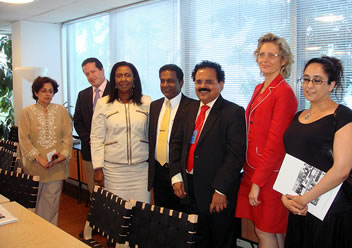
New York, July 12, 2011
In her opening remarks, Ms. Shazia Z. Rafi, Secretary-General of PGA, expressed her gratitude to the participants at the Workshop and gave special thanks to H.E. Sergio de Queiroz Duarte, United Nations High Representative for Disarmament, for taking the time to deliver a briefing on the status quo of the Arm Trade Treaty negotiation process. Ms. Rafi also expressed appreciation to Ambassador Jarmo Viinanen, Permanent Representative of Finland to the UN, for hosting this important event. Ambassador Viianen underlined that Finland firmly supports the creation of a strong and effective Arms Trade Treaty as it is among the seven countries that co-authored the original UN General Assembly resolution on the ATT in 2006.
Ambassador Viinanen observed the importance of wide circles of stakeholders engaging themselves with the ATT process. For any future ATT to be successfully implemented, the broadest possible participation from all will be needed. He added that the engaged and committed work of Parliamentarians for Global Action in support of the ATT will be crucial for the ratification of the treaty around the world.
Dr. Ruth Wijdenbosch, Acting President of PGA, and Deputy Speaker of the Parliament from Suriname went back in time and reminded the participants that, in many ways, PGA had 'started life' over 30 years ago as a group of Parliamentarians from around the world advocating for Disarmament, and had played an essential role in making the Comprehensive Test Ban Treaty as well as the Chemical Weapons Convention reality. PGA's Peace & Democracy Program has been actively advocating for a robust Arms Trade Treaty as far back as 2006 when PGA held a Workshop on Small Arms and Light Weapons and a Proposed Arms Trade Treaty in the House of Representatives of the Philippines in Manila. Dr. Wijdenbosch motivated parliamentarians to take advantage of this week and to promote a strong and legally binding ATT, since it is important "to get it right from the beginning". In her presentation, she set out a step-by-step 'inventory list' of steps and measures that MPs can take in support of the ATT, both prior to and after it is established.
In his keynote address, H.E. Sergio de Queiroz Duarte, United Nations High Representative for Disarmament, recalled that the ready availability of weapons and ammunition has led to human suffering, repression, crime and terror among civilian populations in all parts of the world.
Parliamentarians from key countries involved in the ATT negotiation process, such as Senator Juan Mario Laserna from Colombia, Dr. Donya Aziz, MP from Pakistan and Mr. Felipe Michelini, MP from Uruguay spoke not only on their respective countries' positions, but also offered some personal insights in terms of how best to move forward in this collective endeavor. They all concurred in the importance of a strong and legally binding ATT to stop armed violence and promote development.
Mr. Thilanga Sumathipala, MP (Sri Lanka) explained that since Sri Lanka is a country which has suffered three different civil conflicts over the past forty years and has witnessed the consequences of free availability and utilization of arms, it has supported the cause of an ATT from the inception.
Ms. Margareta Cederfelt, MP (Sweden) noted that the poorly regulated global trade in conventional arms and ammunition has helped to prolong conflict, increase poverty and has contributed significantly to serious abuses of human rights and breaches of international humanitarian law.
Mr. E.M.S. Natchiappan, MP (India) reminded participants on the rising health costs that are caused by the non-existence of adequate international arms trade regulations, and that it is always women and children who suffer disproportionally. Mr. Natchiappan indicated that he believed the issue of 'brokering' should also be properly addressed in the ATT, as it is often middlemen who reap the greatest profits at the cost of human lives in the international arms trade.
In making certain closing observations, Mr. Peter Barcroft dwelt again on the important role that parliamentarians can play in promoting a strong and effective Arms Trade Treaty. The goal of this workshop was to find different ways in which lawmakers can play a substantial role in making a robust ATT a meaningful reality; and the fruitful dialogue that took place had helped to fulfill this objective. The important priority now was to follow-up in respective parliaments, upon returning home.
This Summary Report was prepared by Ms. Leyla Nikjou, Program Associate, PGA and lightly edited by Mr. Peter Barcroft, Senior Program Officer, PGA
